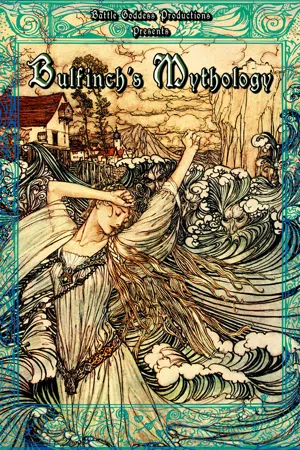
- 496 pages
- English
- ePUB (mobile friendly)
- Available on iOS & Android
Bulfinch's Mythology
About this book
This is a cornerstone piece for anyone wanting to dive deeper into mythology of various kinds.
Mr. Bulfinch does a wonderful job in making a collective account of stories for most of the entities he covers, including several excerpts from poets, historians, Milton, Homer, as well as his own brother and many more. Traversing from Greek and Roman to Hindu and Celtic and beyond, this is a great book for any mythology lover.
If that wasn't enticing enough, we added in the volumes of "King Arthur and His Knights" and even "Legends of Charlemagne" to give you an unforgettable resource and collection. This contents of this book were created in the late 1800's and thus, the wording and spelling of many of the deities, places, and beyond are vastly different from their modern versions. In an attempt to bring this up to speed, while still maintaining its original state, Battle Goddess Productions has replaced the spellings that may hinder someone's ability to discover more research on the stories and mythology found within.
This includes the spelling of names, such as but not limited to, Corea – Korea, Thibet – Tibet, or in some cases we added the alternative spelling "Halcyone/Alcyone" in order not to lose the original grip it holds. Another change we did was break out the dialogue and excerpts so that they may stand out clearly and be easier read or found. we hope these extra efforts involving the textual content make this a more pleasant experience for discovering mythology.
The artwork found within is a collection of work from a mixture of artists from over a hundred years ago and older. A listing of artists can be found in the back matter so you may search for more of their work within our edition. Not all of the public domain images had the artist labelled, but we felt the "unknown" deserved to be shown off right along with the more well-known artists. The collective was known for illustrating fairy tales, mythology, or even prior versions of Bulfinch's own publications including Arthur Rackham, a personal favorite. If you have ever wondered where and how so many authors tie mythology into their work, then this book may be the key you were looking for. Within this piece are many stories both familiar and lesser known.
There will be information discovered in here that may shed light on modern retellings and inspired work like "American Gods" by Neil Gaiman to our very own "Cedric the Demonic Knight" by Valerie Willis. By no means is this a complete collection of all things mythology, worldly, or monsters. Though, as a complete geek for mythology, it is a must-have as part of your at-home collection. There are several other up to date sources, but this is a flavor you will not, cannot, find.
If you wish to research these further, seek out other books such as J.A. Coleman's "Dictionary of Mythology, " "The Encyclopedia of Celtic Mythology and Folklore" by Patricia Monaghan, "Norse Mythology A to Z" by Kathleen N. Daly, and even Carol Rose's "Giants, Monsters, and Dragons" – all of these are found in our very own arsenal of go-to books for research.
Frequently asked questions
- Essential is ideal for learners and professionals who enjoy exploring a wide range of subjects. Access the Essential Library with 800,000+ trusted titles and best-sellers across business, personal growth, and the humanities. Includes unlimited reading time and Standard Read Aloud voice.
- Complete: Perfect for advanced learners and researchers needing full, unrestricted access. Unlock 1.4M+ books across hundreds of subjects, including academic and specialized titles. The Complete Plan also includes advanced features like Premium Read Aloud and Research Assistant.
Please note we cannot support devices running on iOS 13 and Android 7 or earlier. Learn more about using the app.
Information
Chapter 1
Introduction
Table of contents
- Bulfinch’s Mythology
- About This Book
- Foreword From Battle Goddess Productions
- Original Publisher’s Preface
- Original Author’s Preface
- The Age of Fable
- Chapter 1
- Chapter 2
- Chapter 3
- Chapter 4
- Chapter 5
- Chapter 6
- Chapter 7
- Chapter 8
- Chapter 9
- Chapter 10
- Chapter 11
- Chapter 12
- Chapter 13
- Chapter 14
- Chapter 15
- Chapter 16
- Chapter 17
- Chapter 18
- Chapter 19
- Chapter 20
- Chapter 21
- Chapter 22
- Chapter 23
- Chapter 24
- Chapter 25
- Chapter 26
- Chapter 27
- Chapter 28
- Chapter 29
- Chapter 30
- Chapter 31
- Chapter 32
- Chapter 33
- Chapter 34
- King Arthur and His Knights
- Chapter 1
- Chapter 2
- Chapter 3
- Chapter 4
- Chapter 5
- Chapter 6
- Chapter 7
- Chapter 8
- Chapter 9
- Chapter 10
- Chapter 11
- Chapter 12
- Chapter 13
- Chapter 14
- Chapter 15
- Chapter 16
- Chapter 17
- Chapter 18
- Chapter 19
- Chapter 20
- Chapter 21
- Chapter 22
- Chapter 23
- The Mabinogion
- Introductory Note
- Chapter 1
- Chapter 2
- Chapter 3
- Chapter 4
- Chapter 5
- Chapter 6
- Chapter 7
- Chapter 8
- Chapter 9
- Chapter 10
- Chapter 11
- Chapter 12
- Chapter 13
- Legends of Charlemagne
- Glossary
- Index of Figures